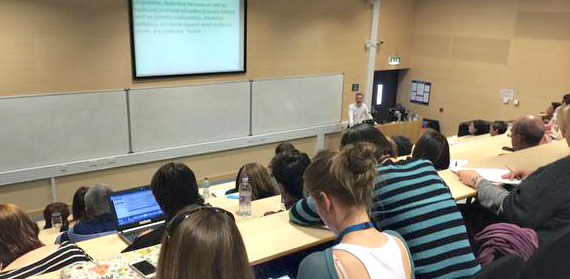Last week, Coventry University welcomed the NSPCC’s Head of Strategy and Development to deliver a talk on the charity’s strategic policies. Jon Brown, who has been with the NSPCC since 1994, came onto campus to explore how the knowledge garnered from services to date can best be transferred and delivered to policy makers and partners.
After beginning with a succinct overview of the NSPCC, Jon presented the ten key achievements that the organisation has had over the past four years. These included award-winning campaigns such as the Underwear Rule, the strong brand recognition that the NSPCC enjoys, and the results and learning that are coming in from the various services over the period.
Next, Jon took a closer look at these services – including the services for neglect, families with complex needs and sexual abuse – and examined what had been learned and achieved so far. Amongst the many notable achievements were the successes of the Domestic Abuse, Recovering Together (DART) service.
DART is a way through which the abused partner in a relationship – typically the mother – can rebuild their relationships with their children who have suffered and/or witnessed the same domestic abuse within the home. The service has proven extremely successful for many of the families involved, with a reduction in the children’s disruptive behaviour and an improvement in the mother’s self-esteem both being cited as results. DART is now being rolled out to local services, in an effective display of the knowledge transfer that Jon’s talk was focused on.
Knowledge transfer and effective replication are core components of the NSPCC’s strategy, and next Jon went on to discuss the key things that the charity has learned about these techniques. Over the years, they have discovered the importance of partnerships and co-design with similar organisations, as well as how essential buy-in from senior management within these companies is. The importance of lobbying for national change was also highlighted.
Finally, Jon gave fascinating insight into the five goals that form the NSPCC’s main strategy for 2016-2021. These are that:
• Fewer children will be abused or neglected when their parents experience alcohol or drug abuse, domestic abuse or mental health issues.
• Fewer children will be sexually abused.
• All children can speak out about abuse and neglect and have adults listen, support and believe them.
• Every child who has been abused or neglected will receive the help that they need.
• Every child will be safe from abuse online.
The university has a strong link to NSPCC thanks to the work of researchers within the Violence and Interpersonal Aggression (VIA) theme, as several members have received NSPCC funding for studies in the past. To find out more, visit VIA. To access Jon Brown’s presentation slides, you can also visit the event’s page.




Comments are disabled